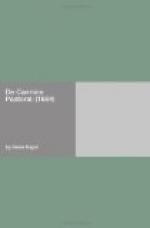But who soft Elegies was the first that
wrote
Grammarians doubt, and cannot end the
doubt:
For I find nothing certain about this matter, since neither Valla a diligent inquirer after, and a good judge in such things, nor any of the late writers produce any thing upon which I can safely rely; yet what beginning this kind of Poetry {14} had, I think I can pretty well conjecture: for tis likely that first Shepherds us’d Songs to recreate themselves in their leisure hours whilst they fed their Sheep; and that each man, as his wit served, accommodated his Songs to his present Circumstances: to this Solitude invited, and the extream leisure that attends that employment absolutely requir’d it: For as their retirement gave them leisure, and Solitude a fit place for Meditation, Meditation and Invention produc’d a Verse; which is nothing else but a Speech fit to be sung, and so Songs began: Thus Hesiod was made a Poet, for he acknowledges himself that he receiv’d his inspiration;
Whilst under Helicon he fed his Lambs.
for either the leisure or fancy of Shepherds seems to have a natural aptitude to Verse.
And indeed I cannot but agree with Lucretius that accurate Searcher into Nature, who delivers that from that state of Innocence the Golden Age, Pastorals continued down to his time, for after he had in his fifth book describ’d that most happy age, he adds,
For then the Rural Muses reign’d.
From whence ’tis very plain, that as Donatus himself observ’d, Pastorals were the invention of the simplicity and innocence of that Golden age, if there was ever any such, or certainly of that time which succeeded the beginning of the World: For tho the Golden Age must be acknowledged {15} to be only in the fabulous times, yet ’tis certain that the Manners of the first Men were so plain and simple, that we may easily derive both the innocent imployment of Shepherds, and Pastorals from them.
{16} The Second PART.
Now let us inquire into the nature of Pastoral, in what its excellencies consist, and how it must be made to be exact: And this must needs be a hard Task, since I have no guide, neither Aristotle nor Horace to direct me; for both they, whatever was the matter, speak not one word of this sort of Verse. And I am of opinion that none can treat well and clearly of any kind of Poetry if he hath no helps from these two: But since they lay down some general Notions of Poetry which may be useful in the present case, I shall follow their steps as close as possible I can.




